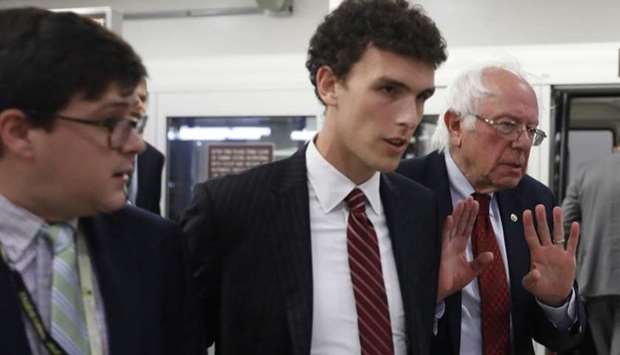Liberal Senator Bernie Sanders is set to introduce a plan Wednesday for US government-funded health care, an idea that has quickly gained traction among Democrats, including several who may launch presidential bids in 2020.
But while support for such a health system has surged among Democrats this year, the party's leaders are not on board.
Sanders, whose ‘single payer’ health insurance proposal helped form the backbone of his campaign revolution against Hillary Clinton for last year's Democratic presidential nomination, said he now has support from 14 fellow senators in the chamber's 48-member Democratic caucus.
Five of them -- Elizabeth Warren, Kamala Harris, Cory Booker, Kirsten Gillibrand and Sanders himself -- are considered potential contenders in the race against Republican President Donald Trump three years from now.
‘Health care should be a right, not a privilege,’ Gillibrand said in a statement announcing her support for Sanders's ‘Medicare for All’ bill.
‘If you want to have the ideals of life, liberty and the pursuit of happiness... health care is an essential part of that, and something that I think should be available to every American,’ Booker told reporters Tuesday.
The legislation has virtually no chance of passage with Trump's party running Washington.
Republicans control Congress, and they are busy on Wednesday unveiling their own bill in the Senate, one that would essentially turn control of the health care markets to the 50 US states.
Supporting the Sanders bill helps Democrats broadcast their progressive bona fides to the millions of voters who backed the iconic liberal independent last year.
If the Democrat who ultimately emerges as their party's 2020 presidential nominee backs a single-payer plan, it could frame a titanic clash with Trump, who campaigned heavily last year on his pledge to repeal and replace Obamacare.
In a sign of the drift toward the more energized wing of the party, a majority of House Democrats have now signed on to a single-payer bill that veteran congressman John Conyers has been introducing regularly for years.
‘It's an idea whose time has come,’ Senator Richard Blumenthal said.
- No 'litmus test' -
Democratic leaders are not particularly keen on the idea.
‘I don't think it's a litmus test,’ top House Democrat Nancy Pelosi, whose declared goal is reclaiming the House of Representatives from Republican control, told The Washington Post.
Her immediate mission is ‘protecting’ Barack Obama's Affordable Care Act, which Republicans could once again try to repeal in September, following several failed attempts this year.
Democrats have expended huge amounts of political capital -- and lost dozens of congressional seats -- defending Obamacare, and leaders are unlikely to want to relitigate such a costly fight for a more progressive plan.
‘What we want is to have as many people as possible, everybody, covered, and I think that's something that we all embrace,’ she said.
Senate Minority Leader Chuck Schumer was also non-committal, as he noted several Democratic proposals, including a bill that offers a ‘public option’ in which government-run health insurance would compete with private insurance companies.
A crucial hurdle is money. Sanders has not explained how much his proposal would cost, but the tab is sure to be hefty.
‘Nobody's figured out how you can afford it yet,’ House Republican Tom Cole told reporters when asked about Sanders's plan.
‘I think they're making the mistake of a lifetime’ to support it, Cole said of Democrats. ‘But I think that's where their party's moving.’
Clinton, during her presidential campaign, knocked the Sanders proposal as unrealistic.
On Tuesday she said Sanders has never leveled with the public about the costs.
‘I'm for universal health care coverage that is high-quality and affordable for every American, and I think there are a lot of ways of getting there,’ Clinton told Vox.
Sanders's plan would universally expand Medicare, the health insurance program for Americans age 65 and above. The bulk of its costs are covered by the government.
Booker insisted supporting the bill had nothing to do with political posturing ahead of 2020.
Democracy for America, which is helping build grassroots support for the legislation, concedes that Medicare for All will not be passed by a Republican Congress. But it sees Democratic support for Sanders's plan as ‘a remarkable turnaround’ for an idea deemed too radical to debate in recent years.

